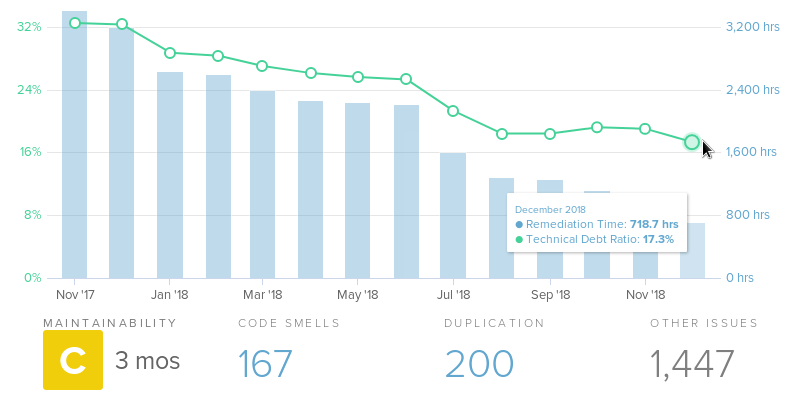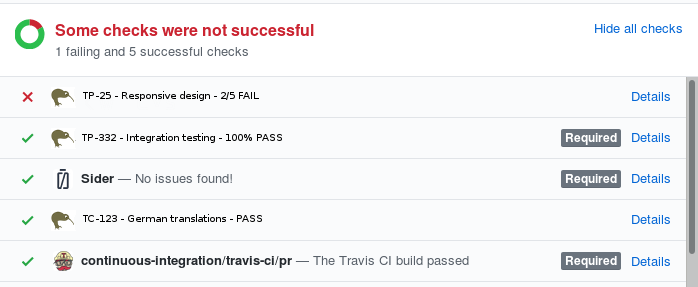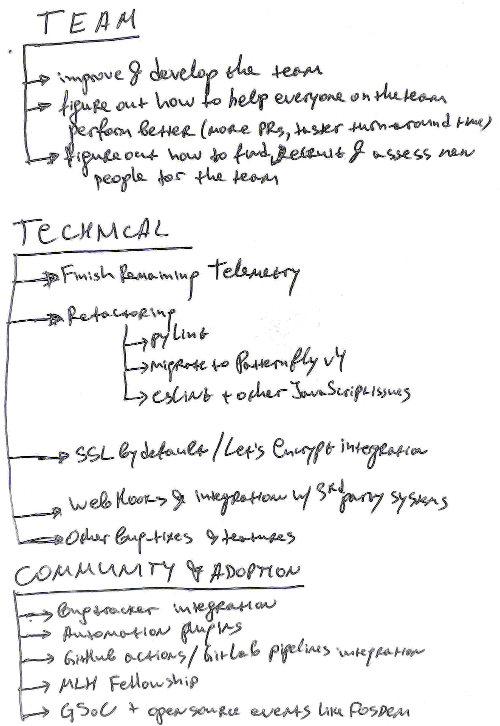Hello testers, Kiwi TCMS has taken on a brave new
mission! We would like to transform the testing process by making it more
organized, transparent & accountable for everyone on your team. Our goal
is to improve engineering productivity and participation in
testing. The following blog post outlines how we would like to achieve
this and what goals we put before ourselves for this year.
Complete the internal refactoring
Last year we took on the challenge to bring a legacy code base up to modern
coding standard. We did not complete that effort but made very good progress
along the way. This is not a small task and that's why our team will continue
with it this year.

- CodeClimate:
0 issues, 0% technical debt, health score A
- Scrutinizer:
only A and B type issues
- Pylint: 0 issues
- Remove vendored-in Handlebars, jQuery, jQuery-UI and TableDnD JavaScript
libraries in favor of existing npm dependencies
- Front-end uses the existing JSON-RPC instead of backend views that
are only used for AJAX requests. Tip: these are usually accessed via
postToURL() and jQ.ajax() on the front-end
- Inspect and classify all 3rd party issues reported from
Coverity and
Bandit. Report and fix
what we can, ignore the rest that do not affect Kiwi TCMS.
Redesign the UI templates with the help of Patternfly
There are 59 templates remaining to be converted to a modern look and feel.
Along with them comes more refactoring and even redesign of the existing pages
and the workflow around them. Together with refactoring this will make Kiwi TCMS
easier to use and also to maintain.
Modernize reporting
We are planning to remove the existing reports feature because they are not well
designed. We will re-implement existing functionality that our community finds useful,
add new types of reports (incl. nicer graphics and UI) and make it possible for the
reporting sub-system to be more easily extendable.
Phase out is planned to begin after 1st March 2019! Until then we are looking for your
feedback. Please comment in
Issue #657!
Plugins for 3rd party test automation frameworks
These will make it easier to collect results from automated test suites into
Kiwi TCMS for later analysis. Instead of creating scripts that parse the
results and talk to our API you will only have to install an additional package
in your test environment and configure the test runner to use it! Automation
test results will then appear inside Kiwi TCMS.
If you would like to use such functionality leave your vote inside GitHub
issues! In case you would like to write a test-runner plugin you can find the
specification
here.
Redefine bug-tracker integration
Question: Does Kiwi TCMS integrate with JIRA?
Answer: Well, it does. How exactly do you want to integrate?
... silence ...
The following dialog happens every time someone asks me about bug-tracker
integration, especially with JIRA. The thing is integration is a specified
set of behavior which may or may not be desired in a particular team. As of now
Kiwi TCMS is able to open a URL to your bug-tracker with predefined field
values, add comments to bug reports and report a simple summary of bugs
inside a TestRun.
We recognize this may not be enough and together with the community we
really need to define what bug tracker integration means! The broader domain
of application lifecycle management tools (of which TCMS is a sub-set) have an
integrated bug tracking system. We can add something like this and save you
the trouble of using JIRA, however many teams have already invested in
integrating their infrastructure or just like other tools. For example we love
GitHub issues and our team regularly makes public reports about issues that
we find internally!
GitHub flow integration
Developers have their
GitHub PR flow and if they
have done the job of having unit tests then they will merge only when things
are green! This leaves additional testing efforts kind of to the side and
doesn't really help with transparency and visibility. I'm not going to mention
having an automatically deployed staging environment for every change
because very few teams actually have managed to do this effectively.

- Goal: Figure out how Kiwi TCMS can integrate with GitHub flow and bridge the gap.
Please share and
+1 your wildest ideas in
Issue #700.
- Follow up: depending on the results in #700 we will follow with other goals and
sub-tasks
Agile integration with Trello
Speaking of modern engineering flow is your team truly agile? When and how
do you plan your testing activities ? Before the devel sprint or afterwards?
How many testers take part in refining product backlog and working on user stories?
Similar to GitHub flow lots of teams and open source projects are using Trello
to effectively organize their development process. Testing should not be left
behind and Kiwi TCMS may be able to help.
- Goal: Figure out how Kiwi TCMS fits into the overall
devel-test-planning
process for agile teams and what we can do to make this easier for testers.
Please share and +1 your wildest ideas in
Issue #701
- Follow up: depending on the results in #701 we will follow with other goals and
sub-tasks
Improve engineering productivity
What makes a test engineer productive when they need to assess product risk and
new features, when mapping product requirements documents (PRD) to test plans and
test cases, when collaborating on user stories and behavior specification ?
What makes developers, product owners, designers and other professionals productive
when it comes to dealing with testing ?
For example consider the following workflow:
- Company has idea for a new product
- In case this is a big product it may have its own mission, i.e. what kind
of problem is it trying to solve and for which group of customers
- Product backlog is then created which outlines features that map
to the product mission
- Then the team, together with test engineers perform example mapping
and discuss and refine the initial feature requirements. User stories
are created
- Behavior specification may also be created
- Test plans and test cases are the immediate product of BDD specs and
desired user stories
Later we iterate through the sprints and for each sprint something like
this happens:
- Desired product features are planned for development. They must be complete
at least in terms of requirements, specs and tests
- Devel writes code, maybe some unit tests, testers can also write automated tests
and/or manually verify the current state of the feature being developed
- Testing, including exploratory is performed before feature is merged
- Rinse and repeat
Devel is also part of testing, right? Product owners, UX and interaction
designers as well. Producing quality software product is a team effort!
In every step of the way Kiwi TCMS can provide notification wizards, guidelines
and/or documentation for best practices, facilitate tooling, e.g. to write user stories
and assess them or map out an exploratory testing session, etc. The list
of ideas is virtually endless. We can even go into deep learning, AI and
blockchain but honestly who knows how to use them in testing ?
Our team is not quite sure how this goal will look like 3 months from now
but we are certain that testing needs to happen first, last and all the time
during the entire software development lifecycle. By providing the necessary
functionality and tools in Kiwi TCMS we can boost engineering productivity
and steer the testing process in your organization into a better, more productive
direction which welcomes participation from all engineering groups.
Let's consider another point of view: testing is a creative activity
which is benefited by putting your brain into a specific state of mind!
For example Gherkin (the Given-When-Then language) has the benefit of
forcing you to think about behavior and while doing so you are vocalizing
the various roles in the system, what kind of actions are accepted and
what sort of result is expected! Many times this will help you remember or
discover missing scenarios, edge cases and raise even more questions!
Crazy ideas, brain dumps and +1 as always are welcome in
Issue #703.
Community
Coding alone is not fun! Here's what you can do to help us:
We are also looking to expand our core team and the list of occasional
contributors. The following are mostly organizational goals:
- Goal: participate in 5 conferences with a project stand
- Goal: define how we find, recruit and onboard new team members. The
foundation is already set in
TP-3
- Goal: clearly mark GitHub issues which are suitable for external contributors
which don’t want to spend lots of time learning how Kiwi TCMS works under the hood.
We're going to tag all such issues with the
 label
label
Development policy
Our team will be working on areas related to the goals above. A +1
reaction on GitHub issues will help us prioritize what we work on!

Bug fixes and other
issues will be occasionally slipped into the stream and pull requests from
non-team contributors will be reviewed and merged in a timely fashion.
There is at least 1 full day of work that goes behind the scenes when
a new version is officially released: compile changelog, build images and
upload them, create blog post and newsletter announcement, share on social
media, etc. We also deploy on our own Kiwi TCMS instance as a stop-gap
measure before making everything public!
New PyPI tarballs and Docker images will be released every few weeks as
we see fit, this has been our standard process. We try to align releases
with Django's release schedule and try to cut a new version when there are known
security vulnerabilities fixed. However we can't guarantee this will always
be the case!
If you are in a hurry and need something quickly the best option is to
send a pull request, build your own Docker image from source and
maybe consider
sponsoring us via Open Collective!
Happy testing!





